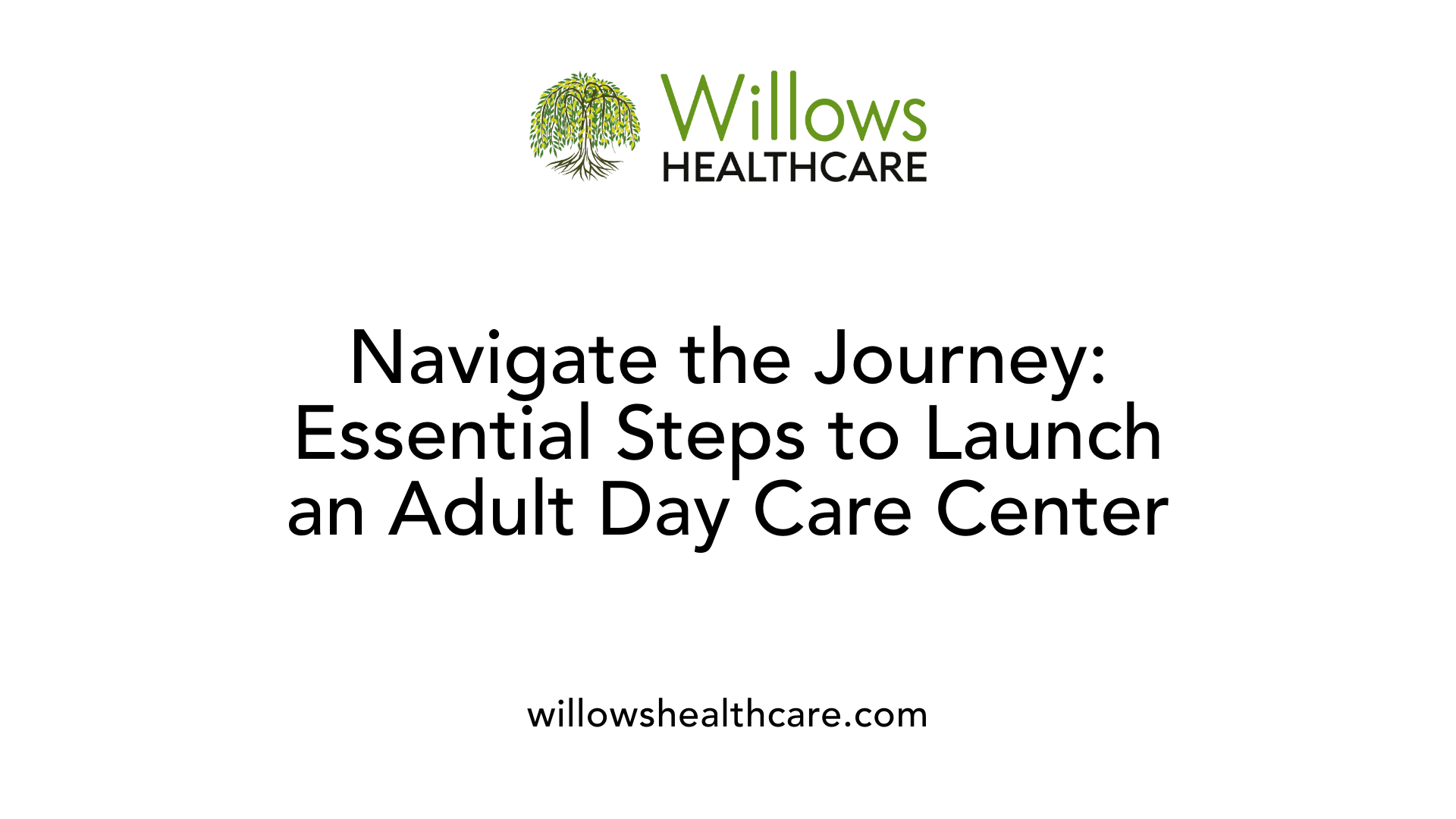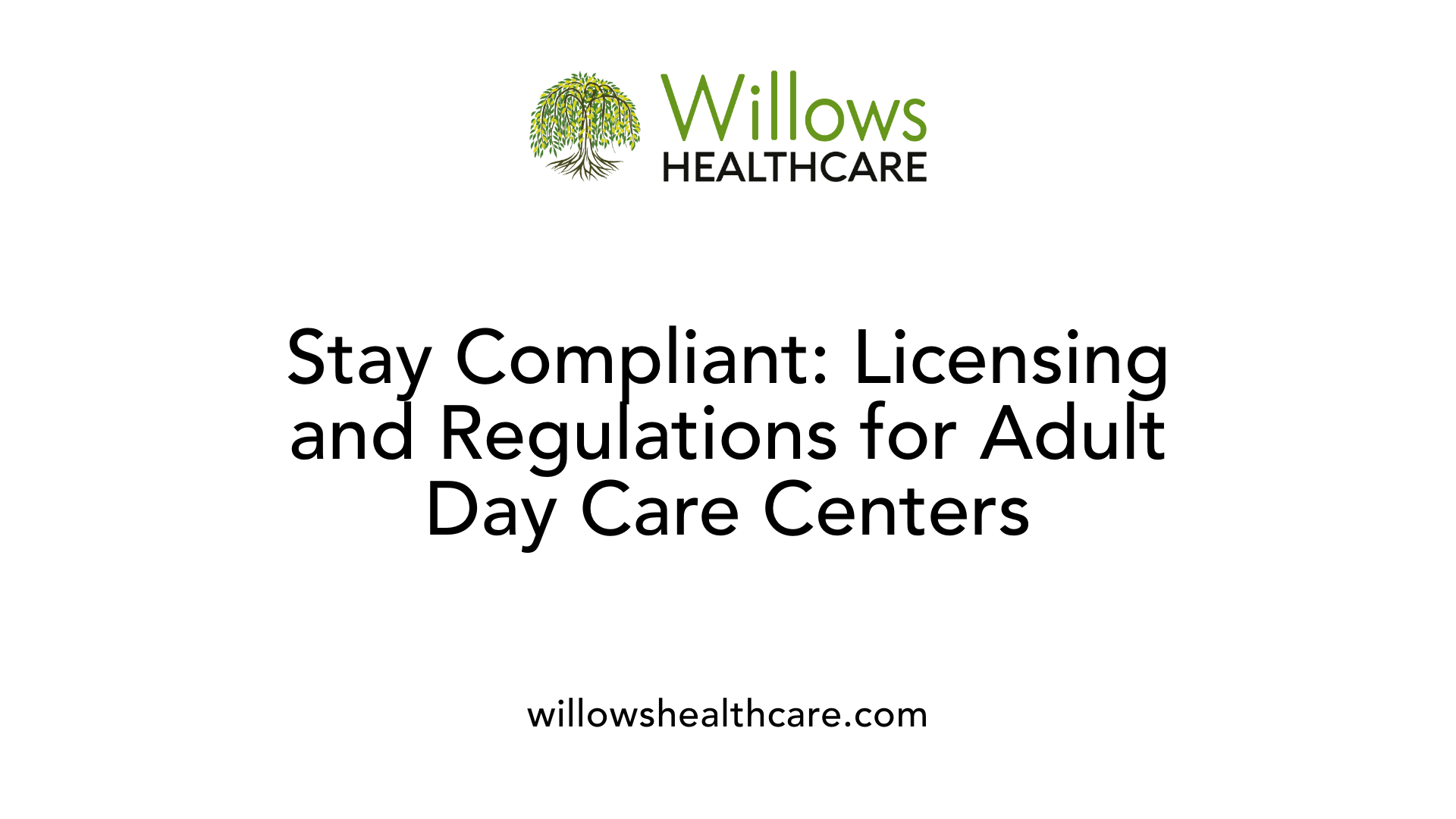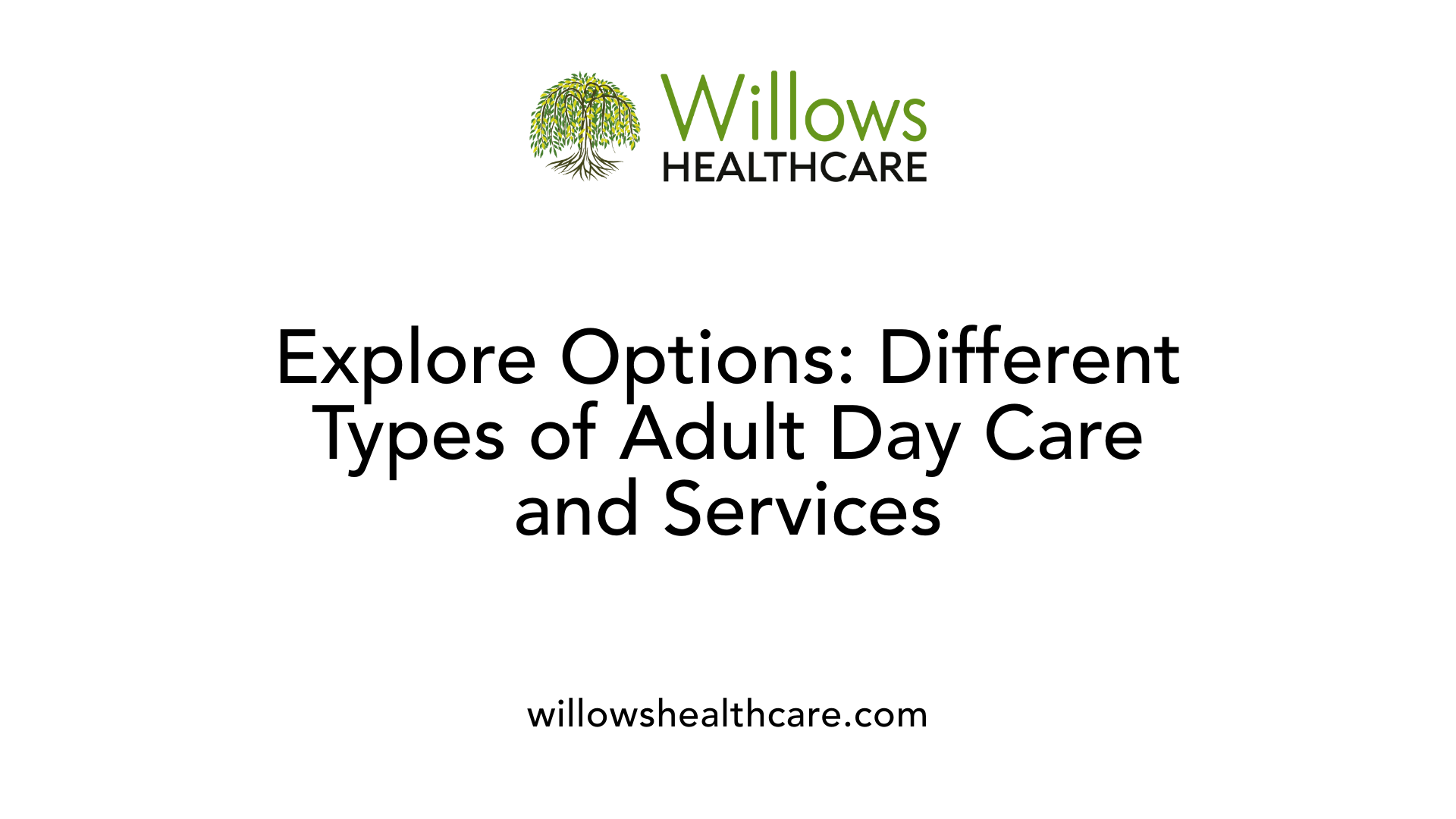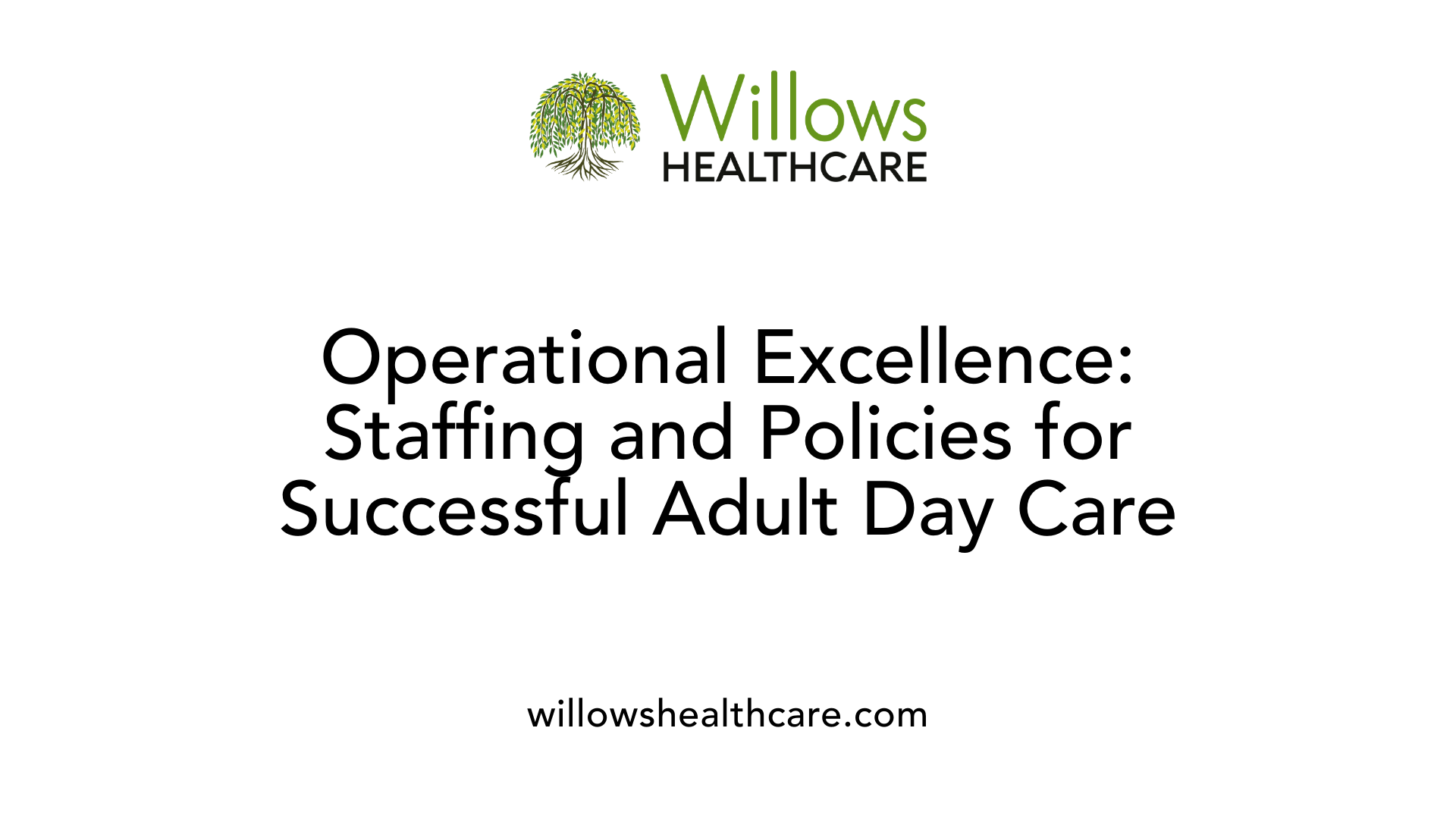How To Start An Adult Day Care?
July 7, 2025
Launching a Compassionate Community Service: Your Guide to Establishing an Adult Day Care


Understanding the Foundations of Adult Day Care
Starting an adult day care is a meaningful way to support aging and disabled populations within your community. These centers provide vital services that delay institutionalization, enhance well-being, and offer relief to caregivers. This guide explores the comprehensive steps, licensing requirements, types of care, operational guidelines, and resources necessary to establish a successful adult day care. Whether you aim to create a nonprofit facility or a for-profit enterprise, understanding the regulatory landscape and service models is essential for sustainable operations.
Step-by-Step Process to Launch an Adult Day Care Center

What are the steps to start an adult day care center?
Starting an adult day care center is a multi-step process that involves careful planning, compliance with state regulations, and community engagement. First, it is essential to conduct thorough market research to identify community needs, analyze demographics, and evaluate the demand for services. Visiting local facilities, speaking with potential clients and families, and assessing existing providers help shape your service offerings.
Secondly, review your state's licensing and regulatory requirements. For example, in California, providers must comply with licensing standards set by the California Department of Social Services (CDSS) and the Department of Aging. In states like Pennsylvania, regulations are outlined in 6 Pa. Code, Chapter 11, covering operational, staff, and safety standards.
Developing a comprehensive business plan is the next crucial step. This plan should detail your target population, service offerings, funding strategies, staffing plans, and marketing approaches. Participants might consider options like acquiring an existing facility, opening a franchise such as ActivAge, or establishing a new center from scratch.
Securing funding and resources is vital. Explore grants from programs like the Older Americans Act, Small Business Grants, or foundations dedicated to elder care. Creating a detailed checklist for expenses, including licensing, facility setup, staffing, initial supplies, and marketing, can facilitate fundraising efforts.
Obtaining necessary licenses and permits is a critical step. This includes submitting an application to the appropriate licensing body, providing documentation such as business registration, facility plans, and staff credentials. Expect a physical inspection to ensure compliance with safety, health, and accessibility standards. For example, your facility must meet space requirements and health regulations.
Choosing a suitable location involves selecting a site that meets accessibility, safety, and space standards. The design should facilitate easy movement, emergency exits, and comfortable environments for clients and staff. Ensuring the facility is compliant with local building codes and has appropriate safety features is crucial.
Hiring qualified staff involves recruiting individuals with experience in elder care or social services. Conduct background checks, provide training on client care and emergency procedures, and establish operational policies covering client safety, medication management, and incident reporting.
Finally, engage with industry support networks and professional associations such as NADSA or CAADS. These organizations offer resources, training, mentorship, and networking opportunities to help your center succeed. Incorporating digital tools for care management and compliance, like StoriiCare, can enhance efficiency and quality of service.
Launching an adult day care center requires dedication, compliance, and community focus. Following these steps systematically can pave the way for a successful and impactful service that supports aging adults and their families.
Understanding Licensing and Regulatory Requirements

What licensing and registration requirements are needed for adult day care centers?
Starting and operating an adult day care center involves navigating various licensing and regulatory requirements that ensure safety and quality in service delivery. These requirements can vary depending on the state and locality but generally include obtaining specific licenses from health or social services authorities.
In California, for example, centers must secure a Community Care License from the California Department of Social Services (CDSS). This license confirms that the facility meets health, safety, and operational standards designed to protect vulnerable populations such as older adults and persons with disabilities.
The licensing process typically involves submitting detailed application forms, which include forms like the Center Operator Identification Form and specific program notification documents. The application process is followed by an on-site inspection where authorities verify facility conditions, staffing, and compliance with established standards.
Centers are required to meet specific health, safety, and accessibility standards — such as appropriate space, emergency protocols, infection control, and staff-to-client ratios. Staff qualifications are also scrutinized, and background checks are mandated to ensure caregiver safety.
Participation in financial reimbursement programs, like the Child and Adult Care Food Program (CACFP), requires compliance with additional standards. To qualify, centers must adhere to licensing or approval standards set by federal or state agencies, sustainable operational procedures, and regular inspections.
In addition to initial licensure, adult day care centers undergo periodic inspections to ensure ongoing compliance. These inspections check for adherence to safety protocols, staffing requirements, and quality of care.
Finally, centers that accept Medicaid or receive public funding must meet specific financial management standards. They must implement systems that prevent the misuse of public funds and ensure transparent operations.
Understanding these regulations helps providers establish compliant facilities that can serve their communities efficiently while safeguarding their clients’ well-being.
| Licensing Agency | Application Requirements | Inspection & Compliance | Reimbursement Participation |
|---|---|---|---|
| California Department of Social Services | Forms, facility plans, background checks | Regular inspections, health & safety standards | CACFP, Medicaid, public funding standards |
| Local Health Departments | Facility permits, safety protocols | Periodic renewal inspections | Varies by program |
| Federal Agencies (for Medicaid & CACFP) | Licensing approval, compliance with federal standards | Ongoing monitoring | Food program and health care reimbursements |
Staying informed about facility-specific regulations helps adult day care providers maintain high standards, access funding opportunities, and deliver quality services to the community.
Types of Adult Day Care and the Services Offered

What are the different types of adult day care and the services they offer?
Adult day care programs in California are designed to cater to a diverse range of needs among adults, especially seniors who require assistance or supervision during the day. These programs are generally categorized into several types, each with its distinct focus and set of services.
Social adult day care centers emphasize social engagement and mental stimulation. They offer activities such as arts and crafts, music therapy, exercise classes, and outings that aim to reduce isolation and promote social interaction. These centers are beneficial for seniors who need companionship, light supervision, and activities that enhance their quality of life.
Adult Day Health Care (ADHC), also known as Adult Day Medical Care, provides more focused health-related services. These include medication management, health monitoring, physical therapy, and chronic disease management. Staffed by healthcare professionals like nurses and therapists, ADHC centers serve frail adults or those with complex health conditions, ensuring continuous medical oversight while allowing participants to remain active within a community setting.
Specialized services for memory care and chronic conditions are available at dedicated centers that cater to individuals with dementia, Alzheimer’s, or other cognitive impairments. These facilities offer tailored activities such as reminiscence therapy, sensory stimulation, and safety measures to help manage symptoms and slow progression. Creating a secure environment, they help individuals maintain function and independence longer.
Activities and therapeutic services
Across all types of adult day care, participants engage in a variety of activities designed to promote physical, mental, and emotional well-being. These include exercise routines, arts and crafts, music and dance, educational workshops, and social outings.
In addition, therapeutic services like occupational therapy, physical therapy, and speech therapy may be integrated, especially in health-focused programs, to support rehabilitation and manage disabilities.
Recreational and health monitoring
Recreational activities serve multiple purposes, from providing enjoyment to facilitating cognitive and physical health. Many centers organize group games, outings, and cultural activities to foster community spirit.
Health monitoring is a critical component, particularly in adult day health care settings. Staff conduct health screenings, oversee medication adherence, and coordinate with healthcare providers to ensure participants’ health needs are met. Transportation to and from the centers adds convenience, enabling more seniors to participate.
In summary, adult day care services in California are varied and adaptable, focusing on promoting independence, enhancing quality of life, and offering necessary supports for adults with different health and social needs. Whether through social interaction, medical management, or therapeutic interventions, these programs provide vital assistance that benefits both participants and their families.
Operational and Staffing Guidelines for Success

What are the staffing ratios, qualifications, and operational requirements for adult day care centers?
Maintaining proper staffing levels is crucial for ensuring high-quality care and safety in adult day care centers. Typically, staffing ratios range from one staff member for every 4 to 8 participants. A common minimum ratio is approximately 1:6, which allows for attentive supervision and personalized assistance. In Pennsylvania, specific ratios are mandated at 1:7, but California and other states may have slightly different standards.
A designated program director or administrator is responsible for overall management, ensuring policies are followed, and that the facility operates smoothly. Additionally, a dedicated activities coordinator helps plan engaging programs, while other staff such as program assistants or aides provide direct support to participants.
Staff should possess relevant qualifications and certifications. Essential certifications include CPR and first aid, which prepare staff to respond swiftly in emergency situations. Clinical staff such as registered nurses (RNs), licensed practical nurses (LPNs), and nurse aides are vital for health monitoring, medication management, and addressing medical needs.
Operational requirements extend beyond staffing. Centers must conduct continuous assessments to evaluate staff-to-client needs, adjusting staffing levels based on participant acuity and complexity. Safety standards must be rigorously maintained, including proper facility design, sanitation, and emergency procedures.
Regular staff training and recertification are mandatory to keep personnel updated on best practices, new regulations, and health protocols. Training may include topics like infection control, resident rights, and emergency response.
Furthermore, centers are required to meet specific staffing hours per resident day to balance quality care with operational efficiency. In some rural or workforce-shortage areas, exemptions or relaxed standards may be granted if certain criteria are met, ensuring continued access to services without compromising safety.
By adhering to these staffing and operational standards, adult day care centers can deliver safe, effective, and compassionate services that support adults’ independence and wellbeing while fostering a secure environment for both participants and staff.
| Aspect | Typical Standards | Specific Requirements and Notes |
|---|---|---|
| Staffing Ratios | 1:4 to 1:8 (commonly 1:6) | Varies by state; California following general recommendations |
| Core Staff Roles | Program director, activities coordinator, aides | Responsible for management, programming, and daily support |
| Qualifications Needed | CPR/First aid certifications, clinical staff (RN, LPN, aides) | Ensures emergency readiness and clinical oversight |
| Operational Standards | Safety, health monitoring, assessment | Regular evaluations, safety drills, compliance with health standards |
| Staff Training | Ongoing, including emergency procedures | Keeps staff updated on best practices and regulations |
| Special Exemptions | Possible for rural or shortage areas | Must meet specific criteria to qualify for exemptions |
These standards serve as a foundation for delivering quality care in adult day centers, helping to promote safety, health, and engagement for all participants.
Resources, Funding, and Continuous Support for Entrepreneurs

What are the funding options and financial planning strategies for starting an adult day care?
Starting an adult day care involves careful financial preparation. Entrepreneurs can access various funding sources to support startup costs and ongoing operations.
Funding options include personal savings, family contributions, and loans from banks or financial institutions. These are often the first avenues considered for initial capital. In addition, grants and subsidies from federal, state, and local government programs can provide significant financial aid.
Medicaid, the Veterans Affairs (VA) benefits, and state-specific programs often offer reimbursements for eligible services, reducing out-of-pocket expenses. Private pay remains a common method for families covering the cost directly.
Long-term care insurance and employer-sponsored dependent care accounts can also assist with expenses. These options help make services more accessible and affordable for clients.
Implementing strong financial planning is crucial. This includes creating a detailed budget that covers startup costs such as licensing, facility upgrades, staffing, and equipment. Ongoing expenses like salaries, utilities, supplies, and marketing should also be factored in.
Revenue streams can consist of client fees, Medicaid reimbursements, and grants. Diversifying income sources helps buffer against financial fluctuations.
Long-term sustainability can be supported by leveraging public programs like Medicaid, the Program of All-Inclusive Care for the Elderly (PACE), and community-based services.
Partnering with financial advisors and tax professionals can maximize benefits, identify deductions, and optimize cash flow. Being aware of tax credits or incentives related to health and social care facilities can also improve financial health.
In summary, a comprehensive approach that combines multiple funding methods with prudent financial management underpins successful adult day care ventures.
For further details, searching 'Funding opportunities for adult day care startups' can provide specific grant programs, loan options, and additional resources.
| Funding Source | Description | Typical Support Level |
|---|---|---|
| Personal Savings | Funds saved personally by owners | Full or partial funding |
| Family Contributions | Financial help from relatives | Supplementary funding |
| Bank Loans | Commercial borrowing | Capital for equipment, facilities |
| Grants | Public and private grants | Up to full project costs |
| Medicaid & State Programs | Reimbursements and subsidies | Operating expenses |
| Private Pay | Client fees | Revenue source |
| Long-term Care Insurance | Insurance reimbursements | Levels vary |
| Employer-sponsored Accounts | Dependent care accounts | Tax-advantaged funds |
How do industry associations and networks support adult day care entrepreneurs?
Joining industry associations like the National Adult Day Services Association (NADSA) and California associations provides valuable networking opportunities. These groups offer resources, training, and guidance on licensing, compliance, and best practices.
Networking with other providers can lead to shared insights, partnerships, and mentorship. Participation in webinars and conferences keeps entrepreneurs informed about emerging trends, regulatory changes, and funding opportunities.
What business planning tools and digital solutions aid startups?
Using online templates for business plans helps structure your startup journey. Incorporating digital care management tools like StoriiCare can enhance operational efficiency.
These tools support care documentation, communication with families, data analytics, staff scheduling, and marketing efforts. They demonstrate a forward-thinking approach, attract clients, and streamline administrative tasks.
What support from legal and consulting firms is available?
Legal firms such as Holt Law specialize in licensing, regulatory compliance, and legal structuring for adult day care centers. Consulting firms can assist with market analysis, business strategy, and operational setup.
Having expert support helps navigate complex regulations, ensures proper licensing, and maintains ongoing compliance, ultimately reducing legal risks.
By utilizing these resources, entrepreneurs can build resilient, compliant, and effective adult day care centers, better serving community needs while ensuring economic sustainability.
Building a Successful Adult Day Care: Key Takeaways & Next Steps
Launching an adult day care requires careful planning, adherence to regulations, and a clear understanding of service offerings and operational standards. By conducting thorough market research, securing proper licensing, and establishing a well-trained staff team, entrepreneurs can create a safe and engaging environment for clients. Ongoing support from industry associations, legal guidance, and digital management tools enhances the quality and sustainability of the service. With strategic funding and community engagement, an adult day care can become a vital community resource that improves lives and supports families.
References
- How to Open a Center - California Association for Adult Day Services
- Starting an Adult Day Program (ADP) / Adult Day Care in California
- 7 Steps to Start an Adult Day Care - StoriiCare
- Adult Day Care Center Eligibility and Licensing/Approval
- Adult Day Services Programs - Care Options
- Adult Day Care | Non-Profit Healthcare Organization in California
- Adult Day Care Center | Florida Agency for Health Care Administration
- Adult Day Care Center Eligibility and Licensing/Approval
- Starting a Senior Day Care Business: A Comprehensive Guide
- Adult Day Care Center Eligibility and Licensing/Approval













